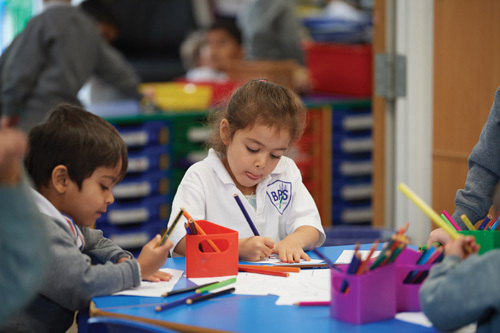
by Jon Chesworth
Headteacher, Banstead Prep
It is becoming increasingly clear that schools should be giving significant thought to how we future proof our children. We must reflect on how we deliver their education and go beyond our core curriculum subjects in increasingly innovative and practical ways. Our motivation is simple: the skills our children need are changing and therefore so must we.
However, there is also another fundamental reason – because it makes learning exciting! Broad and varied educational experiences inspire and engage children and enable them to have fun with their learning, and when children are having fun, when they are happy, they flourish! These broad experiences can enhance rather than dilute academic progress children make across all subjects, and this is what education in the 21st century should look like.
All schools will have a set of values or approaches to how they teach such skills for life. At our school we call them our ‘Attitudes for Learning’, but whatever the name, it’s a focus on the ‘soft skills’, which are often ironically the hardest to teach. These skills and attitudes transcend way beyond the classroom and subject knowledge and are truly transferable to all aspects of life. The World Economic Forum’s list of the top 10 skills employers want from a future workforce should serve as a tick list for what schools must be teaching. Critical thinking, problem-solving, innovation, creativity, self-management, resilience and flexibility currently top that list. It seems reasonable therefore to ensure we are developing these skills to prepare children for life, not just the next step in their education.
There is of course a striking similarity between these and the key skills set out in the Early Years Foundation Stage, the very first step of this educational journey. I believe educators have a duty to continue developing these skills, not just in the early years, but throughout the time children spend in formal education and whilst we can develop many of these in any subject, one of the best ways to do it is through the wider curriculum.
There was a recent debate about whether cooking should be part of the National Curriculum. As a truly fundamental life skill it makes sense, but like so many subjects, the barriers limiting schools’ ability to deliver often come down to a lack of facilities and time. Some schools are luckier than others with facilities and we have a cookery room and a STEM centre where we can nurture a broad range of subjects, but dedicating space and time in the curriculum to life skills is half the battle. If we place great significance on these wider aspects of education and the softer skills and we make time for them, it is not a compromise, it adds to the learning experience in every sense.
Teaching of life skills really begins in nursery, as educators support children to navigate their way into their exciting new world of school, particularly focusing on developing children’s independence. As children move through primary school these skills should evolve not just as preparation for life beyond school but also to engage them to understand their strengths, interests and help bring subjects to life! A good life skills curriculum helps target and develop transferable skills for life in a fun and practical way and they learn so much by participating in these activities, developing skills they are some-times not even aware of using.
As an example, the skills and experiences that our life skills curriculum encourages include entrepreneurship, design and research, collaboration and leadership. Activities such as prototype product design – challenging gender stereotypes, exploring marketing and packaging. Money skills, understanding finance concepts by planning a party! Building business skills through the Virgin Money Young Entrepreneur programme, planning, budgeting then cooking a three-course meal in a Ready Steady Cook event. By participating in these our children develop their attitudes for learning, resilience, leadership, adaptability, curiosity, independence, collaboration and communication.
A dedicated life skills curriculum will of course nurture a multitude of valuable traits but many of these skills should and can of course be taught in every subject, all the time. Developing a commitment to curiosity in our school communities should be embraced at every opportunity. By adopting a schoolwide approach to developing these skills for life, we create exciting opportunities for subject collaboration and school wide activities. Venturing away from or collapsing the traditional curriculum can feel overwhelming at times, but the open-ended learning potential of doing projects or activities in innovative ways is well worth it! Ensuring that there are frequent ways to apply problem solving, critical thinking, innovation and the appropriate and discerning use of technology should be the responsibility of every teacher in every subject!











